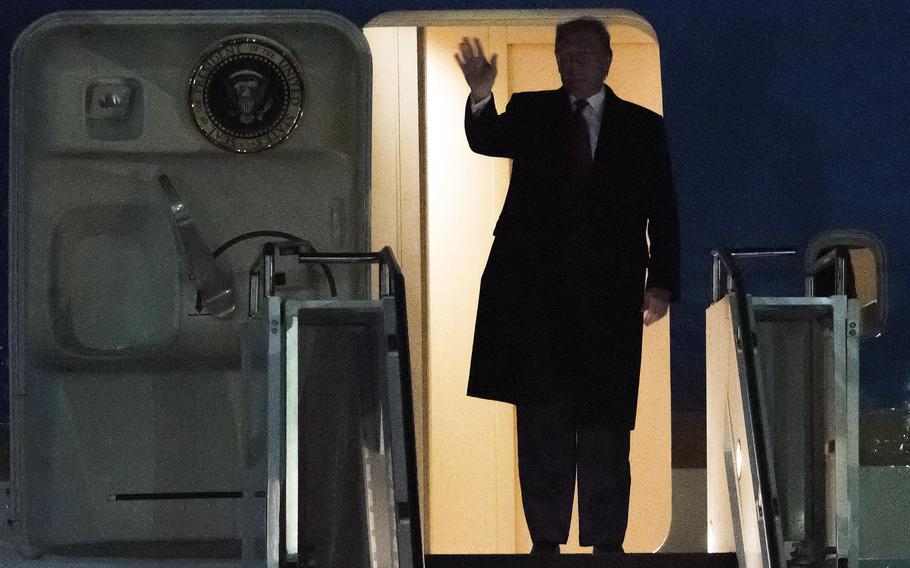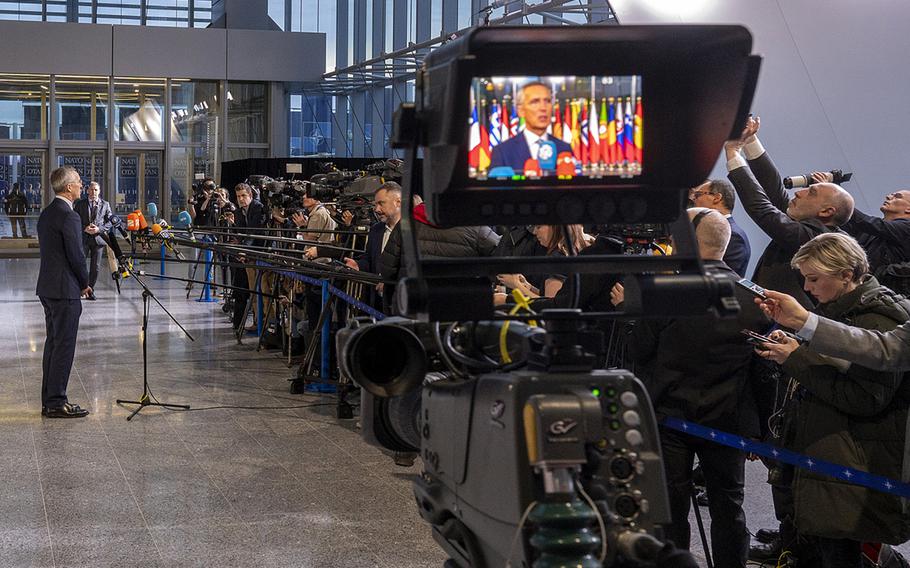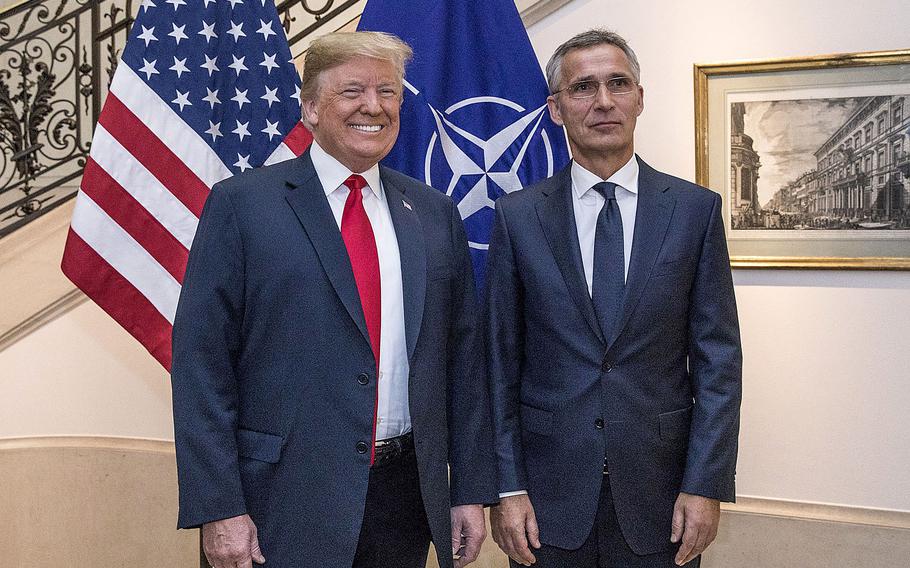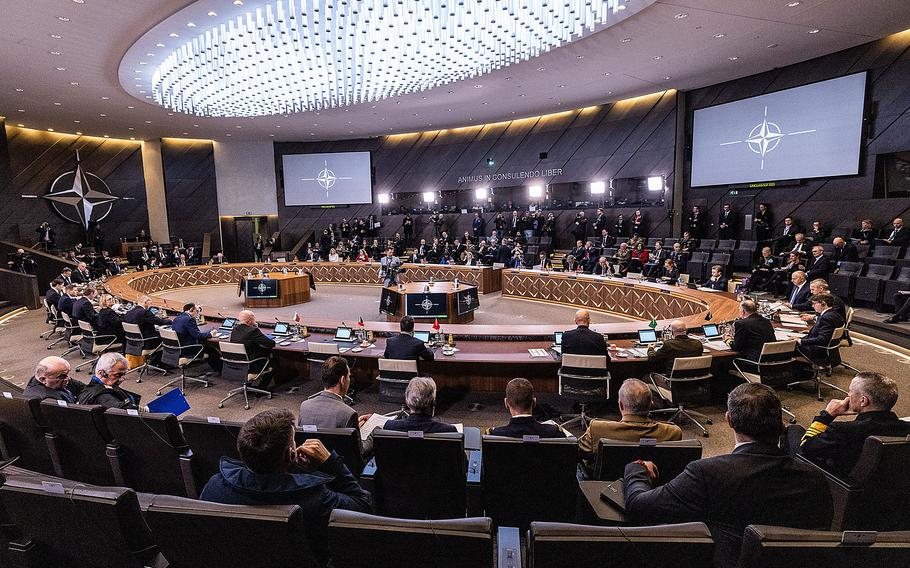
Then-President Donald Trump waves to onlookers as he exits Air Force One at the Toledo Express Airport in 2020. Trump won't be at Munich's annual security conference this weekend, but what his possible second term as president would mean for European security is expected to be discussed. (Kregg York/U.S. Air National Guard)
STUTTGART, Germany — Donald Trump’s declaration that he would encourage Russia to “do whatever the hell they want” to some NATO allies has once again put the former American president on center stage in Europe, where angst over a potential second term is overshadowing discussions this week stretching from Brussels to Munich.
On Friday, Vice President Kamala Harris and other global leaders will gather in Munich for an annual security conference centered around instability in Europe connected to Russia’s war in Ukraine, turmoil in the Middle East and questions about China’s military ambitions in Taiwan.
Against that backdrop, Trump’s recent statement that he would oppose defending allies from a Russian attack, depending on whether those countries spent enough on their militaries, is looming over events.
In Brussels, NATO defense minister talks got underway Thursday with the formal agenda focused on boosting ammunition production to replenish stockpiles that have been depleted while supporting Ukraine in its two-year-old war against Russia.
But the talk quickly turned to Trump and whether a possible second term would undercut the essence of the NATO alliance, which is organized around the principle that an attack on one member is an attack on all.

NATO Secretary-General Jens Stoltenberg talks to reporters before the Feb. 15, 2024 defense ministerial meeting at the alliance headquarters in Brussels. (NATO)
NATO Secretary-General Jens Stoltenberg, who will head to Munich after NATO’s meeting wraps up Thursday, has been peppered with questions the past two days about what the implications of a Trump second term would mean for NATO.
While he didn’t indicate a return of Trump would mean the end of NATO, he issued several rebukes.
“We know that any suggestion that we are not there to protect and defend all allies will undermine the security of all of us and put at risk our soldiers, our personnel who are on the front lines to protect the whole alliance,” Stoltenberg said Thursday. “So one for all, all for one applies for all allies and is the heart of NATO.”
However, Trump’s comments, made during a campaign event in South Carolina on Saturday, have cast doubt on the reliability of the U.S. commitment to that core NATO principle should the Republican frontrunner return to office.
During his tenure, Trump frequently criticized allies for falling short on a NATO pledge that members dedicate 2% of their respective GDP to their militaries, complaining that the situation amounted to free-riding on American military might.

Then-President Donald Trump meets with NATO Secretary-General Jens Stoltenberg in Brussels in 2018. Stoltenberg has been peppered with questions this week about what the implications of a Trump second term would mean for NATO, following the former president's remarks that he would oppose defending certain allies from a Russian attack. (NATO)
While other U.S. presidents have also complained about Europe’s underinvestment in defense, Trump’s hectoring on the issue also entailed the threat that he wouldn’t defend members he deemed security backsliders.
Some critics have suggested that Trump’s focus on defense spending is less about wanting to build up allied militaries and more about hastening NATO’s demise.
“I was there when he almost withdrew, and he’s not negotiating,” former Trump national security adviser John Bolton told Politico on Tuesday. “His goal here is not to strengthen NATO, it’s to lay the groundwork to get out.”
In Europe, numerous leaders have condemned Trump’s recent remarks.
German Chancellor Olaf Scholz said Trump’s statements were “irresponsible and dangerous and solely in the interests of Russia.”
Stoltenberg on Thursday was asked whether Trump’s comments meant that Europe should prepare to go it alone depending on how the U.S. election turns out.
While Europe has stepped up defense investments in recent years, “that is not an alternative to NATO … We should not pursue any path that indicates that we are trying to divide Europe from North America,” Stoltenberg said.

The NATO defense minister talks got underway at the alliance's headquarters in Brussels Feb. 15, 2024. The formal agenda focused on boosting ammunition production to replenish stockpiles that have been depleted while supporting Ukraine against Russia's nearly two-year-old invasion. (NATO)
Indeed, Europe has a long way to go to come close to matching U.S. military capabilities, given that American defense expenditures represent about two-thirds of military spending by alliance members, according to NATO data.
Still, the Pentagon budget covers American global commitments far beyond Europe, while members on the Continent concentrate their spending closer to home.
Meanwhile, allies in Europe continue to make progress on the issue that has been at the heart of Trump’s complaints. Stoltenberg said 18 of NATO’s 31 members will hit the 2% of GDP spending target this year and that combined spending by European members also will hit the 2% mark.
“That is another record number,” Stoltenberg said ahead of Thursday’s ministerial.